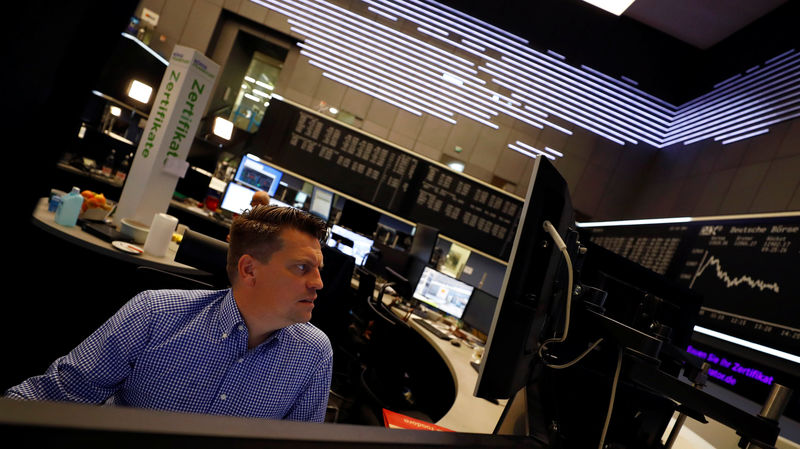By Claire Milhench
LONDON (Reuters) - European fund managers cut their global equity holdings to five-month lows in February after a sharp sell-off early in the month that wiped $4 trillion off share prices, but most thought stocks were still likely to test new highs.
Reuters' latest monthly asset allocation poll of 19 European investors was carried out between Feb. 12-26 following a global rout that saw world stocks (MIWO00000PUS) tumble 5.1 percent in their worst week in two years.
The CBOE VIX index of implied volatility (VIX) for the S&P 500 -- Wall Street's "fear gauge" -- spiked to 50 on Feb. 6 in its biggest one-day jump in over two years. Both the S&P 500 (SPX) and the Dow Jones (DJI) suffered their biggest percentage drops since August 2011.
Following the correction investors cut their stocks exposure by 1.8 percentage points to 44.2 percent of their global balanced portfolios, the lowest level since September 2017. They raised cash to 6.4 percent, the highest since October.
"The market correction has removed some of the complacency in risk assets, however, we see the potential for further spikes in volatility as markets are still displaying tight valuations," said Pascal Blanque, chief investment officer at Amundi.
Global equities are set to end February down 3.5 percent, their first monthly loss since October 2016. Yet around 88 percent of poll participants who answered a question on the equity bull market thought stocks could test new highs, surpassing the peaks scaled in late January.
Jan Bopp, asset allocation strategist at J Safra Sarasin, was among those saying the S&P 500 could close the year higher than January's top.
"Fundamental data is still strong, earnings are solid and the (U.S.) tax reform should give them another boost," he said. "Bear market risk remains relatively low, as we do not expect a continued, sharp deterioration of the growth/inflation mix."
But poll participants trimmed their U.S. stocks exposure to 37.3 percent of their global equity portfolios, the lowest level since October.
Francois Savary, chief investment officer of Prime Partners, said the second half of the year would be less supportive for U.S. equities, and expressed a preference for Europe, Japan and emerging markets, where he thought the recent highs should be overcome more significantly.
In the poll, investors increased their emerging markets stocks exposure by 1.7 percentage points to 16.3 percent. Most notably, Asia ex-Japan was raised by 2.1 percentage points to 7.4 percent, the highest level since September 2016.
MSCI's benchmark emerging stocks index (MSCIEF) did not escape the global sell-off and looks set to end the month down around 4.4 percent.
The broad-based correction was triggered in early February when U.S. wage growth figures sparked fears the Federal Reserve was behind the curve and would need to increase borrowing costs far more aggressively than expected.
U.S. 10-year Treasury yields (US10YT=RR) leapt to a four-year high of 2.94 percent in mid-February.
Although yields have retreated since, around 69 percent of poll participants who answered a question on this topic thought they would end the year above 3 percent.
"A tight U.S. labor market, emerging capacity constraints, a twin deficit that needs to be financed and the dollar on a longer-term weakening trend suggest Treasury yields could end 2018 above 3 percent," said Peter van der Welle, a strategist at Robeco.
Florian Spaete, senior equity strategist at Generali (MI:GASI) Investments, agreed, saying inflation risks were tilted to the upside. He expects three further rate hikes by the U.S. Federal Reserve this year of 25 basis points each.
"As we do not expect the depreciation of the U.S. dollar to be reversed, this calls for a more hawkish stance by the Fed as well," he said.
Should you invest $2,000 in GASI right now?
With GASI making headlines, savvy investors are asking: Is it truly valued fairly? In a market full of overpriced darlings, identifying true value can be challenging. InvestingPro's advanced AI algorithms have analyzed GASI alongside thousands of other stocks to uncover hidden gems. These undervalued stocks, potentially including GASI, could offer substantial returns as the market corrects. In 2024 alone, our AI identified several undervalued stocks that later surged by 30 or more. Is GASI poised for similar growth? Don't miss the opportunity to find out.
Reveal Undervalued Stocks Now